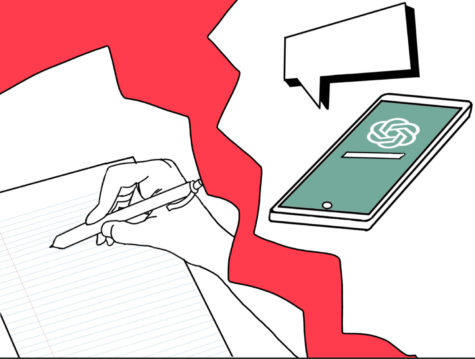Opinion | ChatGPT creates efficient teaching, learning methods

April 20, 2023
Cheating is a plague affecting schools everywhere, especially with developing technology.
Often, little can be done to prevent cheating in schools, so teachers must preach ethics and honesty in hopes that students will take the moral high road. While it’s widely acknowledged that cheating harms students’ learning, we also have to face the fact that it will never go away and, instead, will only get worse as our tools get more advanced. Much of the recent discussions surrounding cheating are due to the newest technology: ChatGPT.
ChatGPT was created by OpenAI, a well-known research and AI company in the tech world. ChatGPT is an advanced AI technology that allows users to have conversations with themselves. It can be used to answer questions, write essays with a given prompt, and much more. According to Meetanshi Blog, ChatGPT gained a million users in less than a week and hit 100 million this February—an unfathomable amount of growth.
However, more and more concerns have arisen from schools surrounding essay writing. Teachers are beginning to fear that the work students may be submitting might be partially or even completely written by artificial intelligence. While these concerns may be valid, ChatGPT—and potentially more advanced technology—won’t go away. Instead of banning its use, teachers need to adapt to its presence and discover methods of integrating it into the classroom.
One of the benefits of ChatGPT is the efficiency of the work. ChatGPT can pull up thousands of facts and information on a subject in a matter of seconds, meaning students won’t have to focus as much time on finding facts on their subject but, rather, can work on the creative aspect of essay-writing. Just as a calculator solves basic math so that students can focus on the equation’s analytical aspects, ChatGPT will allow them to focus on what really matters in essay-writing. Too often is high-school English writing overly strict and formatted, preventing students to dive into their creative mindset, something crucial for the real world. ChatGPT enhances the value and uniqueness of students.
“I’ve used ChatGPT at home a couple of times to just find inspiration for projects,” sophomore Sarah Skey says. “Instead of being stuck with writer’s block, [ChatGPT] was able to pull up a bunch of topics and themes I could use in my writing.”
For Skey, ChatGPT has helped her develop as a writer as well.
“I can really focus on the important aspects of writing with the features it provides.”
On the other spectrum on education, ChatGPT has also been helpful in math classes.
“I picked a math topic, properties of logarithms, and asked ChatGPT to write ten practice problems for me,” Math teacher Blaire Rose says. “What I got back was a diverse selection of practice problems on that topic. Then I asked for solutions to the problems, and it provided me with the solutions.”
“I could see this as a real benefit for students when they are studying for a math assessment. If they know which topics they are struggling with, they could ask ChatGPT for practice problems on those topics,” Rose says.
One of the biggest burdens on teachers is grading. Essays and tests take weeks and sometimes months to grade. Students are left stressing about their scores and teachers spend endless hours outside of work grading. This is why ChatGPT can benefit both students and teachers. According to IE Corporate, teachers can request ChatGPT to grade assignments and even give personalized feedback. Teachers can, then, spend their time preparing relevant curriculums rather than grading, and students will get their work back faster and effectively understand exactly what to improve on for next time.
“I’ve also had ChatGPT critique some of my personal writing, and it’s surprisingly specific. I think if my teachers were more open to using it, they could see that it might help them with grading and looking at assignments and stuff,” Skey comments.
Overall, a curriculum would keep students challenged with immediate feedback, allowing them to improve in all academic aspects.
“Everyone gets confused in class at times, including me. I think it would be really nice to have that extra support available online instead of feeling like I’m bothering my teachers all the time,” Skey says.
Another point discussed by IE Corporate is how ChatGPT can help students better understand subjects. One of ChatGPT’s’ most useful factors is its ability to answer any question, on any topic, a user may have. For example, students can utilize this tool by asking AI questions after class. If students like Skey are confused, they can ask for more clarification on a certain subject or even learn all about the subjects directly from the AI. Teachers can move from unit to unit with ease because they do not have to answer questions from every single student. ChatGPT can also be a useful tool for teachers when it comes to summarizing lessons,
“At the end of each lesson, we could decide as a class what questions we could ask ChatGPT if we wanted more practice outside of class with the topics we just learned,” Rose comments.
While the effects of ChatGPT in school settings such as ETHS aren’t inherent yet, we can assume that they will push learning in a positive direction. AI services like ChatGPT are the future of education, and ETHS must continue to adapt to a futuristic lifestyle full of advanced technology, instead of taking the easy route of banning it.
“Hopefully when teachers and students educate ourselves on how to use ChatGPT and what its capabilities are,” Rose says, “we can figure out ways to use it to enhance the learning experience at school rather than take away from it.”









